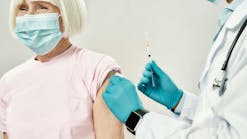Companies announce positive Phase 3 efficacy results for plant-based COVID-19 vaccine candidate
Medicago, a biopharmaceutical company headquartered in Quebec City, Canada, and GlaxoSmithKline plc (GSK) announced positive efficacy and safety results from the global Phase 3 placebo-controlled efficacy study of Medicago’s plant-based COVID-19 vaccine candidate in combination with GSK’s pandemic adjuvant, conducted in over 24,000 adult participants across six countries.
Vaccine efficacy was demonstrated in an environment dominated by SARS-CoV-2 variants.
The overall vaccine efficacy rate against all variants of SARS-COV-2 was 71%. The corresponding number for people with an initial seronegative status indicating no previous exposure to COVID-19 was 75.6%. The vaccine candidate demonstrated efficacy of 75.3% against COVID-19 of any severity for the globally dominant Delta variant. Efficacy was 88.6% against the Gamma variant. Although only a small number of severe cases occurred in this study, none occurred in the vaccinated group. No cases of the Alpha, Lambda and Mu variants were observed in the vaccinated group while 12 cases were observed in the placebo group. The Omicron variant was not circulating during the study.
Based on these results, Medicago will imminently seek regulatory approval from Health Canada as part of its rolling submission. The vaccine candidate is not yet approved by any regulatory authority.
“This is an incredible moment for Medicago and for novel vaccine platforms. The results of our clinical trials show the power of plant-based vaccine manufacturing technology. If approved, we will be contributing to the world’s fight against the COVID-19 pandemic with the world’s first plant-based vaccine for use in humans,” said Takashi Nagao, CEO and President at Medicago.
Medicago said it has been developing its plant-based technology for the past 20 years, producing Virus-Like Particles (VLP) for its protein vaccines. VLPs are designed to mimic the native structure of viruses, allowing them to be easily recognized by the immune system. Because the VLPs lack core genetic material, they are non-infectious and unable to replicate. VLP vaccines developed by other technologies have traditionally been used worldwide for more than 30 years.
The Phase 3 portion of the trial was launched in March 2021 and was an event-driven, randomized, observer-blinded, crossover placebo-controlled design that evaluated the efficacy and safety of the vaccine candidate formulation, compared to placebo, in over 24,000 subjects across Canada, the United States, United Kingdom, Mexico, Argentina, and Brazil.
The vaccination regimen calls for two doses (3.75 microgram of antigen in combination with GSK’s pandemic adjuvant) given intramuscularly 21 days apart. The vaccine is stored at 2 °C to 8 °C, enabling the use of traditional vaccine supply and cold chain channels.





